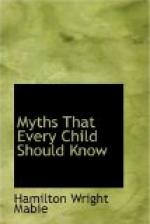And yet, in his earlier days, before he was so entirely possessed of this insane desire for riches, King Midas had shown a great taste for flowers. He had planted a garden, in which grew the biggest and beautifullest and sweetest roses that any mortal ever saw or smelt. These roses were still growing in the garden, as large, as lovely, and as fragrant as when Midas used to pass whole hours in gazing at them, and inhaling their perfume. But now, if he looked at them at all, it was only to calculate how much the garden would be worth if each of the innumerable rose petals were a thin plate of gold. And though he once was fond of music (in spite of an idle story about his ears, which were said to resemble those of an ass), the only music for poor Midas, now, was the chink of one coin against another.
At length (as people always grow more and more foolish, unless they take care to grow wiser and wiser), Midas had got to be so exceedingly unreasonable that he could scarcely bear to see or touch any object that was not gold. He made it his custom, therefore, to pass a large portion of every day in a dark and dreary apartment, under ground, at the basement of his palace. It was here that he kept his wealth. To this dismal hole—for it was little better than a dungeon—Midas betook himself, whenever he wanted to be particularly happy. Here, after carefully locking the door, he would take a bag of gold coin, or a gold cup as big as a washbowl, or a heavy golden bar, or a peck measure of gold dust, and bring them from the obscure corners of the room into the one bright and narrow sunbeam that fell from the dungeon-like window. He valued the sunbeam for no other reason but that his treasure would not shine without its help. And then would he reckon over the coins in the bag; toss up the bar, and catch it as it came down; sift the gold dust through his fingers; look at the funny image of his own face, as reflected in the burnished circumference of the cup, and whisper to himself, “O Midas, rich King Midas, what a happy man art thou!” But it was laughable to see how the image of his face kept grinning at him, out of the polished surface of the cup. It seemed to be aware of his foolish behaviour, and to have a naughty inclination to make fun of him.
Midas called himself a happy man, but felt that he was not yet quite so happy as he might be. The very tiptop of enjoyment would never be reached, unless the whole world were to become his treasure room, and be filled with yellow metal which should be all his own.
Now, I need hardly remind such wise little people as you are, that in the old, old times, when King Midas was alive, a great many things came to pass, which we should consider wonderful if they were to happen in our own day and country. And, on the other hand, a great many things take place nowadays, which seem not only wonderful to us, but at which the people of old times would have stared their eyes out. On the whole, I regard our own times as the strangest of the two; but, however that may be, I must go on with my story.




